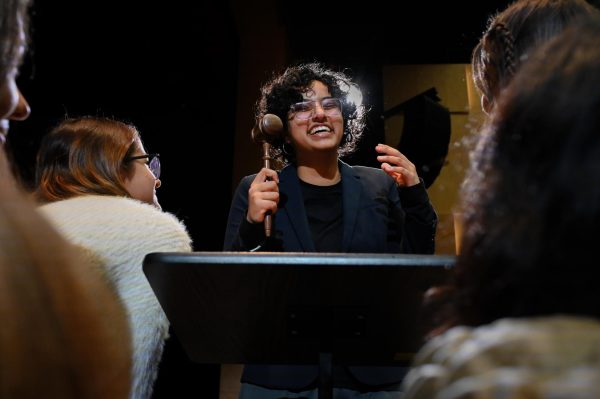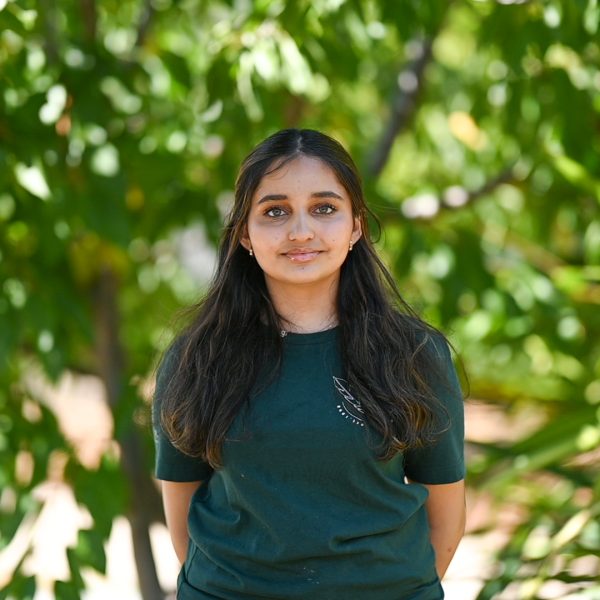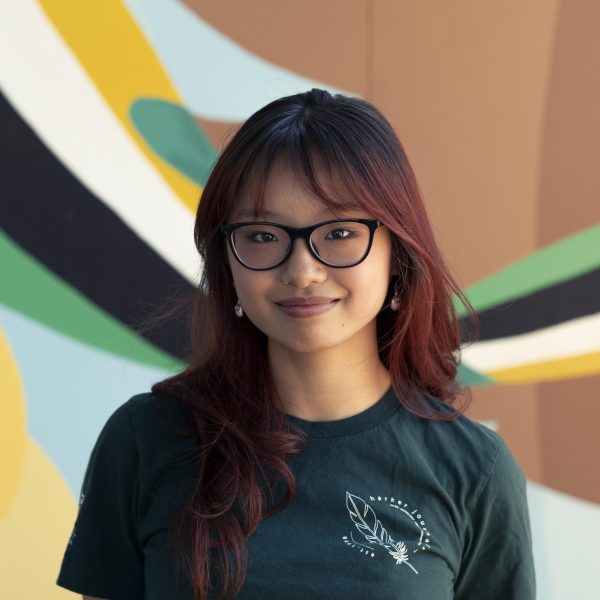
In front of thousands of students, senior Sam Parupudi stands with a microphone, steadying herself before delivering an announcement. Although she has stood there countless times, each appearance brings a familiar rush of nerves. It’s a familiar feeling, one that hasn’t gone away despite years of experience, but Sam has learned how to move through it. As student body president, she faced this challenge again and again, turning moments of anxiety into opportunities to learn how to lead and speak publicly with confidence.
“It was a lot of coming to terms with who I really was,” Sam said. “Every time I go up there for a school meeting, my heart rate genuinely reaches 160; it doesn’t get any easier. It’s just a matter of how you deal with that anxiety. It’s kind of like spice — everybody feels spice the same, but some people get more used to it. For me, that happened through a series of announcements that I made.”
Sam’s journey into leadership began in eighth grade when she took the initiative to apply to her grade’s class council. Because her eighth grade was during the pandemic, she started off by making quick online announcements through Zoom meetings and email. The transition to in-person meetings and speeches was daunting, but over time, Sam grew into the role.
Dean of Students Kevin Williamson has overseen Sam’s involvement in student leadership since her frosh year. He remarks on her growth as a leader and the increased responsibility she has taken on.
“When you’re suddenly carrying the weight of the school on your shoulders as president, you’re really looking for solutions and meanings to some difficult problems,” Williamson said. “Sam has always been a responsible, hardworking student, but being responsible for so many others takes it to another level.”
The newfound confidence Sam developed through student leadership has found new avenues in the arts, where she started to explore both performing and working behind the scenes through technical theater. Sam had already been engaging in the arts through Kuchipudi, a classical Indian dance form she trained in since childhood. After picking it back up in sixth grade and continuing it in high school, the practice became less about the spotlight and more about the people around her.
“I don’t do it particularly because I enjoy dancing or performing, but because I enjoy the community that comes along with it,” Sam said. “Sitting there with the other performers, complimenting each other, doing each other’s hair — that’s what I really value.”
However, in ninth grade, Sam found her true calling in technical theater. With each show, she stepped further into leadership roles backstage, drawn to the unique challenges of live production and the unpredictability of performance nights.
“My favorite part of technical theater, paradoxically, isn’t the technical side — it’s the soft skills,” Sam said. “It’s more like telling people what to do and staying calm under pressure. If something goes wrong, you have to know exactly who to tell and what to fix. I like being someone other people can rely on, and I like the rush of adrenaline when something nerve-wracking is happening onstage.”
The communication and leadership skills Sam honed in technical theater has also shaped her work in public policy. Through youth-led civic initiatives focused on equity and access, she organized workshops, supported local education reform and helped pass several bills by mobilizing others to speak up and get involved. Whether coordinating testimony or managing outreach, she found that the same behind-the-scenes instincts apply.
“When it comes to passing bills, you’re communicating with a bunch of different people, even though you all have the same goal,” Sam said. “That communication is very difficult. There are people I need to mobilize to testify, people I need to launch social media campaigns, people I need to check in with every few days — and that’s not too different from calling cues or managing a crew. It’s about knowing who to talk to, when, and what needs to be done so the whole thing can move forward.”
Beyond the logistics and strategy of public policy, Sam’s work has led her into conversations that deeply challenged her perspective. While organizing testimony for mental health and housing-related legislation, she stepped outside the Harker and Bay Area bubble, speaking with people whose lived experiences were shaped by the very issues the bills aimed to address.
“ I came into contact with people who would actually be affected,” Sam said. “Testimony for things like suicide prevention training or efforts to prevent homelessness — it was eye-opening. The stories I heard about how near and dear these issues were, and how much education could help, really stayed with me. It made everything feel more real.”
Much of Sam’s drive to advocate for others comes from a place closer to home. When she was nine, her family moved from Washington State to California in search of a more supportive environment for Sam’s older brother, who is autistic.
“I’ve kind of had this mentality of thinking about others as well as just myself,” Sam said. “I’ve seen how people treated my brother, and I think that’s been one of the biggest things that’s pushed me to speak up for people whose voices aren’t typically heard.”
The empathy Sam has developed through these interactions in public policy and personal experiences extends into her everyday life, shaping how she shows up for the people closest to her. Close friend senior Jia Jia Jiang admires Sam’s ability to balance thoughtfulness with humor.
“Sam is always very outgoing and brings a lot of creative ideas to the table,” Jia Jia said. “She’s a very caring person. She knows when people are struggling and try to help however she can. And when I’m feeling down, Sam really knows how to lighten the mood — she crack a lot of dad jokes, and always makes me laugh.”
That same attentiveness to others also defines Sam’s presence in the classroom. English teacher Pauline Paskali, who taught Sam in ninth and eleventh grade, notes the way she engages thoughtfully with peers.
“What sets Sam apart is that she’s very curious about what other people think in the room,” Dr. Paskali said. “She always wants to bring others into the conversation and is genuinely interested in different perspectives.”
Whether on stage, in policy meetings or casual conversations with classmates, Sam’s choices are guided by a deep awareness of the people around her. Her commitment to empathy, understanding and amplifying unheard voices is rooted not just in long-term goals but in the belief that everyday actions carry weight.
“While most people would say the future motivates them, I think the present motivates me,” Sam said. “Every single one of my actions, whether small or big, could have a massive impact on someone I wouldn’t know. I choose to go about my day in the most meaningful way possible, by doing the smallest yet biggest things.”


















![“[Building nerf blasters] became this outlet of creativity for me that hasn't been matched by anything else. The process [of] making a build complete to your desire is such a painstakingly difficult process, but I've had to learn from [the skills needed from] soldering to proper painting. There's so many different options for everything, if you think about it, it exists. The best part is [that] if it doesn't exist, you can build it yourself," Ishaan Parate said.](https://harkeraquila.com/wp-content/uploads/2022/08/DSC_8149-900x604.jpg)




![“When I came into high school, I was ready to be a follower. But DECA was a game changer for me. It helped me overcome my fear of public speaking, and it's played such a major role in who I've become today. To be able to successfully lead a chapter of 150 students, an officer team and be one of the upperclassmen I once really admired is something I'm [really] proud of,” Anvitha Tummala ('21) said.](https://harkeraquila.com/wp-content/uploads/2021/07/Screen-Shot-2021-07-25-at-9.50.05-AM-900x594.png)







![“I think getting up in the morning and having a sense of purpose [is exciting]. I think without a certain amount of drive, life is kind of obsolete and mundane, and I think having that every single day is what makes each day unique and kind of makes life exciting,” Neymika Jain (12) said.](https://harkeraquila.com/wp-content/uploads/2017/06/Screen-Shot-2017-06-03-at-4.54.16-PM.png)








![“My slogan is ‘slow feet, don’t eat, and I’m hungry.’ You need to run fast to get where you are–you aren't going to get those championships if you aren't fast,” Angel Cervantes (12) said. “I want to do well in school on my tests and in track and win championships for my team. I live by that, [and] I can do that anywhere: in the classroom or on the field.”](https://harkeraquila.com/wp-content/uploads/2018/06/DSC5146-900x601.jpg)
![“[Volleyball has] taught me how to fall correctly, and another thing it taught is that you don’t have to be the best at something to be good at it. If you just hit the ball in a smart way, then it still scores points and you’re good at it. You could be a background player and still make a much bigger impact on the team than you would think,” Anya Gert (’20) said.](https://harkeraquila.com/wp-content/uploads/2020/06/AnnaGert_JinTuan_HoHPhotoEdited-600x900.jpeg)

![“I'm not nearly there yet, but [my confidence has] definitely been getting better since I was pretty shy and timid coming into Harker my freshman year. I know that there's a lot of people that are really confident in what they do, and I really admire them. Everyone's so driven and that has really pushed me to kind of try to find my own place in high school and be more confident,” Alyssa Huang (’20) said.](https://harkeraquila.com/wp-content/uploads/2020/06/AlyssaHuang_EmilyChen_HoHPhoto-900x749.jpeg)




